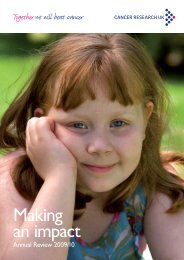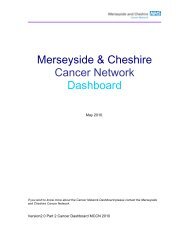Annual Report and Accounts 2010/11 - Cancer Research UK
Annual Report and Accounts 2010/11 - Cancer Research UK
Annual Report and Accounts 2010/11 - Cancer Research UK
- No tags were found...
You also want an ePaper? Increase the reach of your titles
YUMPU automatically turns print PDFs into web optimized ePapers that Google loves.
Chairman’s statement<br />
It was welcome news that despite other public sector cuts,<br />
the government affirmed the country’s international st<strong>and</strong>ing<br />
in scientific research by re-confirming its commitment to<br />
the new institute. Of the total £650 million project cost,<br />
<strong>Cancer</strong> <strong>Research</strong> <strong>UK</strong> has committed to fund £160 million.<br />
This will require a capital appeal as funds generated by<br />
regular fundraising activities are needed to support ongoing<br />
research programmes.<br />
Since its formation almost a decade ago, <strong>Cancer</strong><br />
<strong>Research</strong> <strong>UK</strong>’s achievements have been remarkable.<br />
Thanks to the well accomplished merger of its<br />
predecessor organisations, the Charity has sustained<br />
a record of scientific innovation, with research<br />
expenditure doubling through this period. Many are<br />
those who have contributed to this progress – made<br />
possible thanks to the great generosity of our many<br />
supporters <strong>and</strong> reflected in a similar increase in<br />
fundraising income over the same period.<br />
It is a privilege to have been appointed Chairman at a most<br />
exciting time for the organisation. Since becoming a Trustee<br />
last year, I have been immensely impressed not just by <strong>Cancer</strong><br />
<strong>Research</strong> <strong>UK</strong>’s extraordinary accomplishments, but by the<br />
enthusiasm <strong>and</strong> unswerving commitment of all those who<br />
work for <strong>and</strong> with the Charity, not least those who give so<br />
generously of their time as volunteers.<br />
We owe a particular debt of gratitude to my predecessor,<br />
Sir David Newbigging, who chaired <strong>Cancer</strong> <strong>Research</strong> <strong>UK</strong><br />
for six years until he stepped down in October <strong>2010</strong>. After<br />
a long <strong>and</strong> successful international career he steered the<br />
development of a strong organisation on which the Charity<br />
can continue to build. We were especially pleased that his<br />
contribution to cancer research was marked by a knighthood<br />
in the 20<strong>11</strong> New Year’s Honours.<br />
Driving progress through research<br />
As the world’s largest independent funder of cancer research,<br />
the Charity has been at the heart of progress which has seen<br />
<strong>UK</strong> survival rates double over the last 40 years. Its research is<br />
responsible for a pipeline of cancer drugs that is unmatched<br />
globally by any other charity; our scientists’ discoveries underpin<br />
modern radiotherapy, as well as most of the world’s leading<br />
drugs used to treat cancer. Thanks to rapid progress, notably<br />
in genetics <strong>and</strong> technology, there are now unprecedented<br />
opportunities to accelerate this research. Given the forecasts<br />
for increasing incidence of cancer worldwide over the coming<br />
decades, it is essential to take full advantage of such potential.<br />
The pursuit of such opportunities is a main driver behind<br />
the creation of the <strong>UK</strong> Centre for Medical <strong>Research</strong> <strong>and</strong><br />
Innovation (to be known as The Francis Crick Institute),<br />
a new biomedical research institute of global import to be<br />
built in central London close to its leading international<br />
hospitals. This project was created through a partnership<br />
between four <strong>UK</strong> biomedical research organisations including<br />
<strong>Cancer</strong> <strong>Research</strong> <strong>UK</strong>, as reported last year.<br />
Challenging year, significant achievements<br />
The fair economic winds which benefited <strong>Cancer</strong> <strong>Research</strong> <strong>UK</strong><br />
during the last decade have however now changed, <strong>and</strong> like many<br />
others we find ourselves in choppier economic water. Indeed <strong>UK</strong><br />
charitable giving has fallen in each of the last three years. This was<br />
reflected in a small decrease last year in the Charity’s fundraising<br />
income from the previous year’s record. A reduction in cash <strong>and</strong><br />
investments <strong>and</strong> a focus on cost efficiency nonetheless enabled<br />
a small increase in total charitable activity.<br />
Through its outreach activities, <strong>Cancer</strong> <strong>Research</strong> <strong>UK</strong> has helped<br />
to keep cancer high on the political agenda. In its new strategy<br />
for cancer, the government has committed substantial additional<br />
funding to cancer services over the next four years. There is an<br />
emphasis on improvements in early diagnosis <strong>and</strong> on a potential<br />
shift towards an individualised approach – ‘personalised medicine’<br />
– in future treatments. New legislation was enacted to protect<br />
people from some of the major causes of cancer such as<br />
exposure to smoking <strong>and</strong> ultraviolet light. A new national bowel<br />
cancer screening test was announced following a 16-year clinical<br />
trial, co-funded by <strong>Cancer</strong> <strong>Research</strong> <strong>UK</strong>.<br />
New appointments<br />
We welcomed two new Trustees to Council – in November<br />
<strong>2010</strong>, Professor Adrian Bird, holder of the Buchanan Chair of<br />
Genetics <strong>and</strong> Director of the Wellcome Trust Centre at the<br />
University of Edinburgh – <strong>and</strong> in March 20<strong>11</strong> former Head of<br />
Group <strong>Research</strong> at Roche Professor Jonathan Knowles, holder<br />
of professorships in Switzerl<strong>and</strong>, Finl<strong>and</strong> <strong>and</strong> the University<br />
of Oxford. We look forward to the important contributions<br />
they bring from their different international perspectives.<br />
Professor Sir David Lane retired as Chief Scientist in early 20<strong>11</strong>,<br />
having made an immense contribution to the Charity over<br />
many years; we wish him well for the future. He is succeeded<br />
as Chief Scientist by Professor Nic Jones of the Manchester<br />
<strong>Cancer</strong> <strong>Research</strong> Centre; we wish him every success in this<br />
important role.<br />
Maintaining world-class research<br />
It has been a pleasure to meet many of our partners during<br />
the year <strong>and</strong> I continue to be impressed by the high esteem<br />
in which <strong>Cancer</strong> <strong>Research</strong> <strong>UK</strong> is held. I am confident that<br />
our executive leadership will respond with characteristic<br />
determination <strong>and</strong> professionalism in the face of tougher<br />
economic circumstances <strong>and</strong> succeed in balancing our<br />
commitments to take advantage of new research opportunities.<br />
The sustained generosity of our many supporters – generosity<br />
that we do not take for granted – is ever more important to<br />
fund research that is recognised as world-class.<br />
Michael Pragnell<br />
Chairman<br />
27 June 20<strong>11</strong><br />
02 / <strong>Annual</strong> <strong>Report</strong> <strong>and</strong> <strong>Accounts</strong> / Chairman’s statement



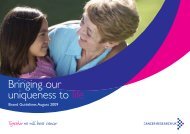
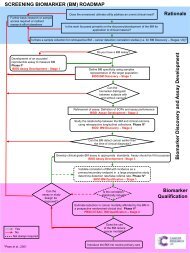
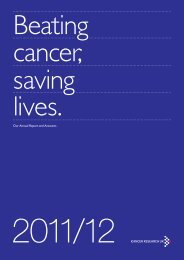
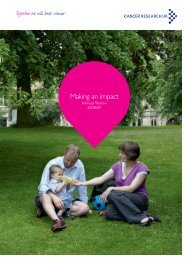
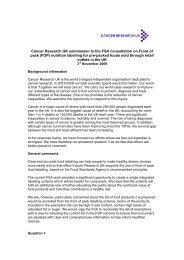
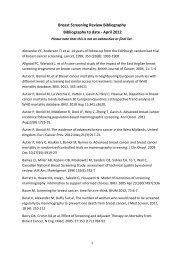
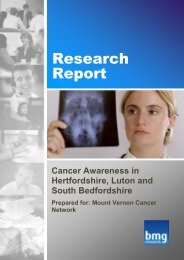
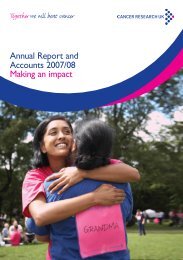
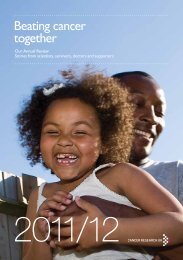

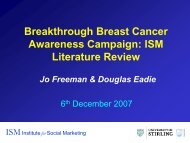
![[PDF] Cancer Research UK's strategy 2009 - 2014](https://img.yumpu.com/29239422/1/184x260/pdf-cancer-research-uks-strategy-2009-2014.jpg?quality=85)
